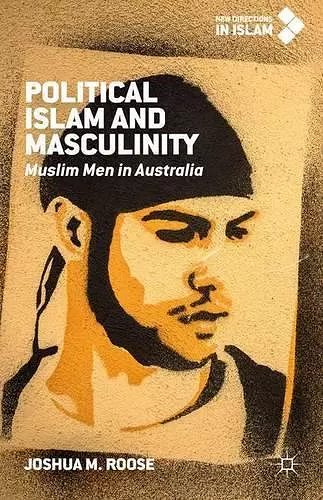Political Islam and Masculinity
Muslim Men in Australia
Format:Hardback
Publisher:Palgrave Macmillan
Published:30th Nov '15
Currently unavailable, and unfortunately no date known when it will be back

"At a time when acts of violence, usually involving young men, are taking place all over the world, in both Muslim-majority and Muslim-minority contexts, it is very good to have this valuable study of Muslim men, their formation, and their widely-differing understandings of Islam, in the Australian context. Roose's study of hip-hop band 'The Brothahood', public intellectual Waleed Aly, and 'radical' group the 'Benbrika Jama'ah' (named after their Algerian-born founder), all in the context of their Australian background, illustrates the wide range of ways in which Islam is interpreted and practised in a significant region of the world. Along the way, issues of gender, mental illness, and conversion are all ably and subtly discussed, so the volume is a fine beginning for Palgrave's new series 'New Directions in Islam'." (Hugh Goddard, Professor and Director of the HRH Prince Alwaleed bin Talal Centre for the Study of Islam in the Contemporary World, University of Edinburgh, and Secretary of the British Association for Islamic Studies) "This book reports on the outcomes of several qualitative studies of young Muslim men in Australia. An equal attention is given to those who have achieved success in public life and those who have chosen extremism and a violent path. Although the studies were carried out in a rigorous scientific way the book should be understandable to readers who have no training in sociology. I can strongly recommend it to everybody who wants to gain an improved understanding of social circumstances of Muslim youth today. It should be particularly valuable to policy makers and those working in government agencies that deal with multicultural issues." (Lazar Stankov, Professor of Psychology, Australian Catholic University , Australia) "An Impressive Work." (Greg Austin, Professor in the Australian Centre for Cyber Security at the University of New South Wales (Canberra), Australia)
The question of Muslim identity–and, more specifically, Muslim masculinities, political loyalty, and action–has become the central pivot for the debate on the place of Islam in the West, state polices on multiculturalism, and even foreign policy towards the Middle East.
The question of Muslim identity–and, more specifically, Muslim masculinities, political loyalty, and action–has become the central pivot for the debate on the place of Islam in the West, state polices on multiculturalism, and even foreign policy towards the Middle East. Young, western-born Muslim men are central figures in these questions, yet their lives and identities remain poorly understood. Political Islam and Masculinity: Muslim Men in Australia reveals important and timely insights into why young Muslim men, often from very similar social backgrounds, are pursuing such dramatically different political paths in the name of Islam. Based on an unprecedented depth of engagement and quality of sources, this book examines the key social influences behind exceptional examples of political action by young Australian Muslim men who have extended their reach into the international realm, from the streets of Jakarta to the battlefields of Syria and Iraq.
Professor Shahram Akbarzadeh, Deakin University, Australia. Concept and quality This is a top quality proposal, promising a top quality book. It engages with the current challenge of integration for Muslim youth in the West - now an urgent issue for the growing fears of Muslim connection with terrorism in Iraq and Syria. This manuscript is prepared with care and attention to detail, using a mix of political sociology and anthropology methodology. The analysis presented in this book rests on an expansive range of primary sources, interviews and records of court hearings - not easily accessible to the public. This rich range of primary and original sources has allowed the author to identify patterns and distinct differences in the way Muslim men cope with contesting pressures in the West. The key question for this manuscript is why and how some young Muslim men turn to extremist ideas and disassociate themselves from society while others embrace the society at large and prosper. This is an important contrast and the author presents a nuanced account of the many factors that bear on his subjects. As a result the book offers a sophisticated examination of Muslim youth identity in the West. This is an important and original contribution to the literature. Style, presentation and structure The writing style is accessible and easy to follow. The organisation is logical and the reader can follow the thread of the argument. The length of the book (maximum 90k words) might be on the high side and put off some readers, but the use of images and tables could be a mitigating factor. Indeed the images are quite powerful and it is important to keep them, and if possible add more where appropriate. If possible, I would consider bringing the text down to 80k words max but not at the expense of any chapter. All chapters fit nicely in this manuscript and need to be preserved. Audience This book is primarily targeted at the academic market, researchers would be its most obvious readers. The second tier of readership is the informed public and policy makers, but this can depend on marketing, presentation and positive reviews. Policy makers are not known for their wide reading habits - but a successful book that deals with Muslim youth integration and the problem of foreign fighters could make an attractive option. There is scope for chapters of this book to be adopted as supplementary reading material in university subjects/units dealing with various aspects of multiculturalism, Muslims in the West, youth studies, or Australian studies. And it is important that this book is brought to the attention of relevant lecturers and librarians.
ISBN: 9781137522290
Dimensions: unknown
Weight: unknown
271 pages
1st ed. 2016